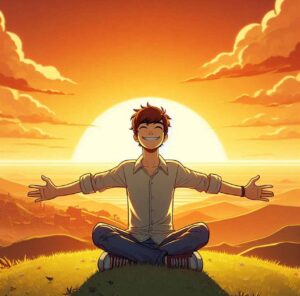Welcome Blessings!
(Tap 🔽 to see more topics!)


To bounce back stronger isn’t some abstract concept; it’s the real-deal toolkit for overcoming life when it throws those inevitable punches. Everyone has those moments. That gut-punch feeling when things don’t go according to plan—a job loss, a relationship falling apart, or just one of those ‘out of nowhere’ curveballs. It’s easy to feel stuck or that you’ll never get back on your feet. But remember those moments, those setbacks, are not the end of the story. They’re opportunities, hidden lessons waiting to be discovered.
Elbert Hubbard, a man who saw a lot of life back in the early 1900s, understood this better than most. He wasn’t just some old philosopher either; he was a real-world entrepreneur and writer who knew what it meant to face challenges head-on. His words and insights on resilience and success still pack a punch today. Let’s look at ten of his most powerful lessons and see how they can give us the extra grit and grace to survive and thrive when life gets tough.
Self-Discipline is Your Superpower
Let’s talk about something compelling that’s often overlooked: self-discipline. With his characteristic directness, Elbert Hubbard defined it as, ‘Self-discipline is the ability to make yourself do what you should do when you should do it, whether you feel like it or not.‘ It’s a simple statement, but it is key to unlocking significant potential.
Self-discipline is like training a muscle. We all know the feeling of not wanting to go to the gym, but the sense of accomplishment and the long-term benefits are undeniable. This principle applies to success in any area of life. It’s not necessarily about innate talent or sheer luck; it’s about consistent, reliable action, even when low motivation is. To practically incorporate this into our lives:
It isn’t about rigid control but about empowering yourself to follow through on what matters. It’s about cultivating a reliable inner strength to achieve your goals consistently.

Gratitude Over Greed
In a world that often shouts ‘more, more, more,’ it’s easy to get caught up in pursuing material possessions. However, Elbert Hubbard offers a refreshing perspective: ‘I would rather be able to appreciate things I cannot have than to have things I am not able to appreciate.’ This quote highlights a crucial distinction between acquisition and genuine contentment.
Consider finally obtaining a long-desired item, a dream car. Initially, the excitement is palpable. Yet, the novelty fades over time, and it becomes just another possession. This phenomenon underscores the reality that lasting happiness doesn’t stem from accumulating things but from cultivating an appreciation for what we already possess.
Therefore, it isn’t about ignoring ambition or dismissing the value of material comfort. Instead, it’s about fostering a sense of contentment and recognizing the inherent value in our present circumstances. Cultivating gratitude is a powerful way to shift our focus from what we lack to what we already have, enriching our lives.
Take the initiative- Don’t Wait for Permission
Next is about taking the initiative, a concept Elbert Hubbard powerfully illustrated in his famous work, ‘A Message to Garcia.’ In that story, a soldier completes a crucial mission with unwavering dedication without waiting for detailed instructions or permission. Hubbard’s message is clear: don’t wait for someone to guide you every step of the way; take the lead and get things done.
We’ve all experienced that moment of hesitation, waiting for ‘the right time’ to begin a project or pursue a goal. The reality is that the perfect moment rarely, if ever, arrives. So, what are you going to do?
Taking initiative isn’t about being reckless; it’s about demonstrating reliability and resourcefulness. It’s about showing you can be trusted to deliver, even in ambiguous situations. And that, in itself, is a valuable asset.

Mistakes are Proof You’re Trying
Let’s be honest; the fear of making mistakes can be crippling. We’ve all experienced that moment of hesitation, that paralysis when faced with something new. But Elbert Hubbard, with his boldness, offered a powerful perspective: ‘The greatest mistake you can make in life is to be continually fearing you will make one.’ It’s a direct challenge to our tendency to avoid risk.
Consider learning to ride a bicycle. It wasn’t about meticulous planning or overanalyzing every movement. It was about getting on, trying, falling, and trying again. That’s how we learn and grow, and the same principle applies to almost everything we do. Mistakes are not roadblocks but vital stepping stones in the learning process. Below are practical approaches to shifting your mindset:
Embracing those mistakes is not a sign of failure but concrete evidence that you’re actively engaging with life and pushing your boundaries. It’s about recognizing that growth stems from doing, not just thinking.
The Right Friends Make All the Difference
Let’s touch on a crucial aspect of our lives that often gets underestimated- the impact of our friendships. With his keen understanding of human nature, Elbert Hubbard once offered this gem: ‘The friend is the man who knows all about you and still likes you.’ It’s a profound statement, highlighting the value of genuine connection.
Every one of us has experienced subtle shifts in our energy depending on who we spend time with. Some people seem to drain us, leaving us feeling depleted, while others have the opposite effect, invigorating and inspiring us. It isn’t just a feeling; it reflects how contagious energy truly is. Therefore, the choice of our inner circle holds significant weight. To apply this practically:
Building a strong, positive network isn’t about cutting people out arbitrarily but rather about creating an environment that fosters personal growth and well-being. It’s about recognizing that the people we choose to spend our time with have a powerful influence on who we become.
Stop Overthinking and Start Living
We spend so much energy replaying past scenarios or worrying about future ‘what-ifs,’ don’t we? In his typically pragmatic way, Elbert Hubbard offered a simple yet profound solution: ‘The best way to prepare for life is to begin to live.’
He’s telling us to stop standing on the sidelines and jump into the game. Consider it like this: you’re at the edge of a pool, debating whether to dive in. You could spend hours analyzing the water’s temperature, depth, or potential splashes. But the only way to truly understand and enjoy the experience is to plunge.
Please note that it isn’t about reckless abandon but shifting our focus from passive contemplation to active engagement. To put this into practice:
It’s about recognizing that life is lived in the present, not the ‘what-ifs’ of the past or future. By taking that leap, we discover what we’re truly capable of.
Turn Your Setbacks Into Setups
Elbert Hubbard had a wonderfully simple way of putting it: ‘He picked up the lemons that Fate had sent him and started a lemonade stand.’ It’s a vivid image. You all also heard those stories, the ones that seem almost unbelievable. Steve Jobs was famously fired from Apple, only to return and revolutionize technology. Oprah said she wasn’t cut out for television, becoming a media powerhouse.
These aren’t just feel-good anecdotes; they illustrate a fundamental truth. What is the difference between those defeated by setbacks and those who thrive? It lies in their ability to reframe the situation. A setback is not a dead end but a redirection. It’s about recognizing that despite disappointment, there’s potential for growth and opportunity.
Instead of dwelling on what went wrong, focus on what can be learned. This shift in mindset can transform obstacles into springboards for future success.
Prepare for Opportunity Before It Knocks
What does preparing for the opportunity before it knocks mean? What if your dream opportunity, job, connection, or chance presented itself tomorrow? Would you be truly ready? Too often, we wait for the perfect moment, the ‘right’ time, when in reality, the best preparation is simply living, learning, and growing now. Opportunity, as they say, favors the prepared.
So, it isn’t about some distant, abstract future. It’s about the everyday choices you make, the skills you cultivate, the knowledge you seek. It’s about consistently improving yourself, even without immediate reward or recognition.
Meaning, it’s about cultivating that readiness, that quiet confidence, that allows you to seize opportunities when they arise. It’s not about luck; it’s about being prepared to make your luck!
Criticism is Proof You’re Doing Something Right
Did you know that criticism often signals you’re on the right track? In his typically blunt way, Elbert Hubbard said, ‘To avoid criticism, do nothing, say nothing, and be nothing.’ It’s a striking statement, but it points to a fundamental truth.
When you’re actively pursuing something, taking risks, or putting yourself out there, opinions will inevitably come your way. Some will be supportive, and others will be less supportive. The crucial thing to remember is that these opinions, whether positive or negative, don’t define your inherent value. Instead of letting criticism derail you, consider this:
It’s about developing the discernment to separate valuable insights from mere opinions. This skill lets you stay focused on your path, empowered by constructive feedback, and unfazed by the rest.
Love and Life Are the Only Things That Matter
When it all boils down, what truly matters? Elbert Hubbard offers a profound insight: ‘It is only life and love that give love and life.’ It’s a simple yet powerful reminder of where our focus should be.
When people reflect on their lives, especially at pivotal moments, it’s rarely about the hours spent at the office or the possessions accumulated. More often, it’s about the connections they forged, their cherished experiences, and the risks they dared to take. It’s about truly living.
This isn’t to diminish the importance of hard work or financial stability but rather to place them in their proper context. Life’s richness lies in the quality of our relationships and the depth of our experiences. So, how can we bring this wisdom into our daily lives?
Again, it’s about cultivating a life rich in love and experience that resonates with genuine meaning. And that, as Hubbard reminds us, is where actual value lies.

Bouncing back isn’t about dodging every pothole life throws your way. It’s about taking those stumbles, those unexpected bumps, and turning them into stepping stones. With his straight-talking wisdom, Elbert Hubbard reminds us that resilience isn’t some far-off ideal that only a few people possess. It’s about learning to walk through the tough stuff with courage, a heart full of gratitude, and a willingness to take action.
Life isn’t always sunshine and rainbows. There will be storms. But the trick isn’t hiding from them; it’s learning to dance in the rain. Now, which one resonated with you? Which one is speaking directly to your situation? And more importantly, what’s one small step you can take today to start putting it into practice?
Because honestly, you’re just getting started. There’s so much more to discover, to experience, to achieve. And those lessons from Hubbard? They’re like a compass, guiding you on your journey. Let’s make that journey a good one, shall we? Voila! Until next time!